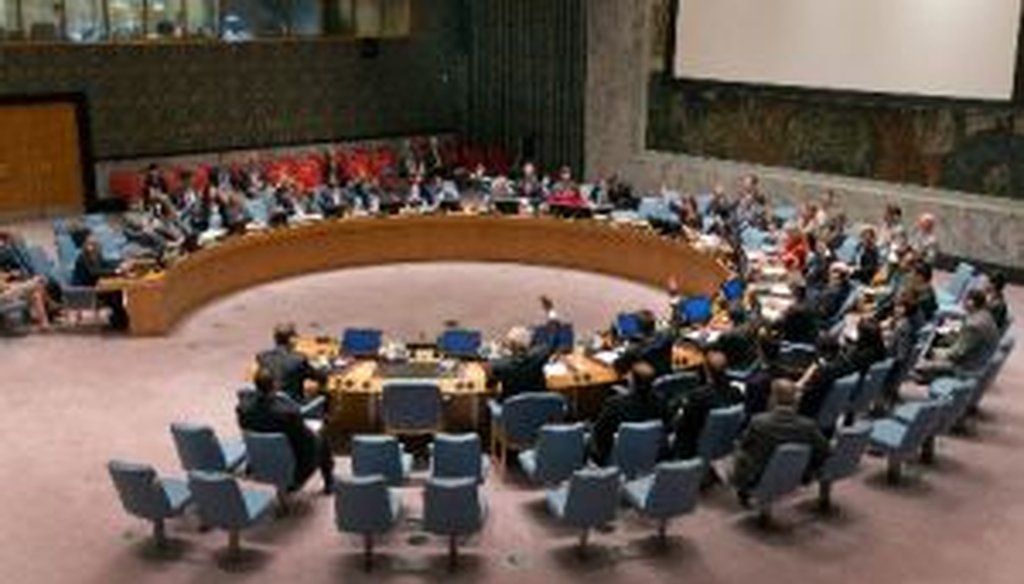Stand up for the facts!
Our only agenda is to publish the truth so you can be an informed participant in democracy.
We need your help.
I would like to contribute

The United Nations Security Council is the key player in international law.
As the United States weighs a strike on Syria for allegedly using chemical weapons, much of the discussion in the American media has focused on whether President Barack Obama will be able to secure the backing of Congress. But even if Obama managed to secure congressional backing, there’s another issue at play: Would a U.S. strike be legal under international law?
We asked several experts to analyze this question for us.
Under international law, the basic framework governing the use of military force is the United Nations Charter. The charter bans the use of force except in the cases of self-defense (if "an armed attack has occurred") or if the United Nations Security Council authorizes it.
The United States cited self-defense after the 9/11 attacks. It has cited Security Council authorizations in Kuwait (1991), Somalia (1992), Haiti (1994), Bosnia (1993-95), and Libya (2011). (The Iraq War that started in 2003 did not have approval under international law. At the time, U.N. Secretary General Kofi Annan called the U.S. invasion "illegal.")
Experts say that neither of these two justifications apply in the case of Syria, at least as long as Russia and China block Security Council approval for a military strike.
Sign up for PolitiFact texts
"There is no authority in the charter for a state to simply enforce international law, even the really important ones, on its own," said Steven R. Ratner, a University of Michigan law professor.
And the fact that the United States would be enforcing the prohibitions of the Chemical Weapons Convention doesn’t change the equation, Ratner said. The convention does not authorize force, but relies on directives from the Security Council to approve enforcement actions.
There’s another justification that has sometimes been offered -- humanitarian assistance -- but it’s controversial. The government of the United Kingdom endorsed this justification in a recent statement about Syria. But most western nations have been loath to use it, fearing that the notion is so broad that authoritarian governments could use it to justify invasions of their neighbors. The United States did not invoke this justification when it began an air campaign in Kosovo in 1999, and it’s not raising the argument in Syria, either.
Most experts we contacted agreed that any U.S. strike without Security Council backing wouldn’t be legal under international law.
"It would seem that even with some support from certain states, the use of force that is being contemplated by the administration would not be permissible under the charter," said Anthony Clark Arend, professor of government and foreign service at Georgetown University.
In a practical sense, international law couldn’t stop a U.S. strike if Obama really wanted to carry one out, since the United States is a sovereign nation.
"The United States has a well-established practice, and as a sovereign nation the inherent right, of using force to defend its national interests," said Ted R. Bromund, senior research fellow at the conservative Heritage Foundation. "The United States has never accepted that it must secure approval from other international actors before taking action in defense of its national interests, even though it may deem that seeking to build the broadest possible coalition is diplomatically, militarily, politically, and morally prudent, and it regularly tries to do so."
The most important consequence of the United States flouting international law would likely be a loss of credibility whenever it sought to invoke international law down the road. Ignoring international law in one context makes it harder for the United States to invoke international law in other scenarios when the United States believes it furthers national interests or global security.
It’s also worth noting that even if the United States considered a strike against Syria to be necessary and an advancement of international peace and security, it couldn’t go a step further and call the strike "legal" under international law.
"Under our Constitution, Congress has the power to violate international law. But Congress doesn't have a magic wand that can turn something that would be illegal under international law into something legal," said Kal Raustiala, UCLA law professor. For instance, he said, in Kosovo -- where the Security Council never gave its approval -- "the United States justified its actions as necessary, but never claimed they were legal."
Our Sources
PolitiFact, "What the law and the past say about attacking Syria," Aug. 30, 2013
U.K. Prime Minister's Office, "Guidance: Chemical weapon use by Syrian regime: UK government legal position," Aug. 29, 2013
BBC, "Iraq war illegal, says Annan," Sept. 16, 2004
Email interview with Ted R. Bromund, senior research fellow at the Heritage Foundation, Sept. 11, 2013
Email interview with Kal Raustiala, UCLA law professor, Sept. 11, 2013
Email interview with Steven R. Ratner, University of Michigan law professor, Sept. 11, 2013
Email interview with Anthony Clark Arend, professor of government and foreign service at Georgetown University, Sept. 11, 2011
Email interview with Mary Ellen O’Connell, University of Notre Dame law professor, Sept. 11, 2013


















































